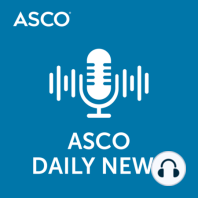10 min listen
Spotlight on Kidney Cancer With Drs. Toni Choueiri and Sumanta "Monty" Pal
FromASCO Daily News
ratings:
Length:
23 minutes
Released:
Dec 9, 2021
Format:
Podcast episode
Description
Guest host, Dr. Neeraj Agarwal, ASCO Daily News editor-in-chief and director of the Genitourinary Cancers Program at the University of Utah’s Huntsman Cancer Institute, discusses the practice-changing KEYNOTE-564 and SWOG 1500 trials with Drs. Toni Choueiri and Sumanta "Monty" Pal. Dr. Choueiri is director of the Lank Center for Genitourinary Oncology at the Dana-Farber Cancer Institute and Dr. Pal is co-director of City of Hope’s Kidney Cancer Program and associate editor of Cancer.Net. (This episode was recorded on 11/18/2021) Transcript Dr. Neeraj Agarwal: Hello, and welcome to the ASCO Daily News podcast. I am Dr. Neeraj Agarwal, the director of the Genitourinary Oncology Program, and the professor of Medicine at the University of Utah Huntsman Cancer Institute, and editor-in-chief of the ASCO Daily News. I'm delighted to welcome two internationally recognized leaders in the field, Dr. Toni Choueiri and Dr. Sumanta (Monty) Pal, for a discussion about two practice-changing studies in kidney cancer published this year-- KEYNOTE-564 and SWOG 1500. As a quick introduction, Dr. Choueiri is the director of Lank Center of Genitourinary Oncology at the Dana-Farber Cancer Institute. He's also the Jerome and Nancy Kohlberg Chair, and professor of medicine at the Harvard Medical School. Dr. Sumanta "Monty" Pal is a professor in oncology, and co-director of City of Hope's Kidney Cancer Program, and he is an associate editor of cancer.net of ASCO. Our full disclosures are available in the show notes. And disclosures relating to all episodes of podcasts can be found on our transcripts at ASCO.org/podcast. Toni and Monty, what a day it has been for our patients with kidney cancer. I woke up with the news of the U.S. Food and Drug Administration (FDA) approval of the first ever adjuvant immunotherapy for patients with renal cell carcinoma. It is so great to have you both on the podcast today. Dr. Monty Pal: Glad to be here. Thanks, Neeraj. Dr. Toni Choueiri: Thank you, Neeraj. So glad to be here. Dr. Neeraj Agarwal: So, let me start by asking questions to you first, Toni. So, you recently published the primary results of the phase 3 KEYNOTE-564 study, showing the efficacy of adjuvant therapy with pembrolizumab and immune checkpoint inhibitor in patients with renal cell carcinoma. And this study led to the approval of pembrolizumab this morning. So, please tell us more about the study design and why did you do this study. Dr. Toni Choueiri: Thank you, Neeraj. And thank you, really, ASCO for this wonderful podcast series. And a big hit, I always listen to them when I'm driving or jogging. And really, thanks for this opportunity because kidney cancer adjuvant therapy has been something like a holy grail we're trying to find for a long, long time. The first adjuvant trial, a randomized trial, in renal cell cancer was in 1973 with radiation therapy. And since that time, all the trials except for one have been a complete failure in a way. And the first adjuvant immunotherapy trial was with old immunotherapy cytokine that we don't use much anymore and was in 1992. I was not done with medical school. I was not actually done with high school at that time, let alone medical school. And now that we have, as we all know, a revolution in the oncology field through these immune checkpoint inhibitors that reinvented immunotherapy in cancer, and now that pembrolizumab has shown activity in patients with more advanced disease, we thought about taking this into the adjuvant setting, a setting of patients where they were subjected to surgery. But on the pathology report, we knew that their risk of this cancer coming back, of recurrence, is somewhat intermediate high or high. These are patients that have stage 2 but grade 4, stage 3, D3, D4. These are patients that had node-positive resected. And we took even patients where the kidney is out, but, also, they had a removal of a metastatic site--let's say a lung metastasis--within a year of removing t
Released:
Dec 9, 2021
Format:
Podcast episode
Titles in the series (100)
#GU22: Learning From the PROpel and MAGNITUDE Trials: Dr. Neeraj Agarwal, ASCO Daily News editor-in-chief, and director of the Genitourinary Cancers Program at the University of Utah’s Huntsman Cancer Institute, shares key takeaways from the PROpel and MAGNITUDE trials in mCRPC, featured at the 2022... by ASCO Daily News
